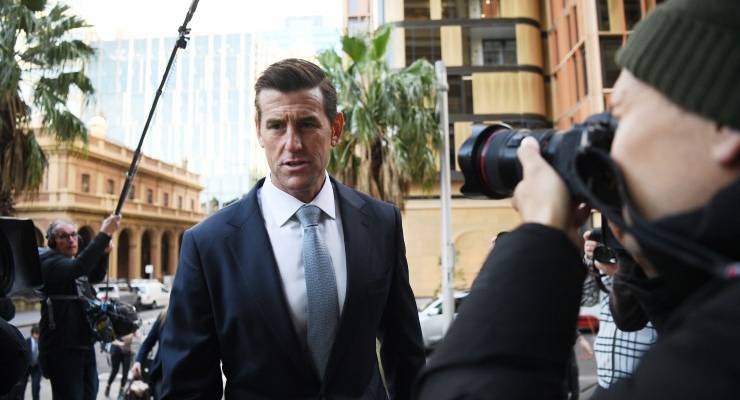
The biggest defamation trial of the modern era opened in the Federal Court in Sydney this morning. To a packed courtroom, counsel for Ben Roberts-Smith, Bruce McClintock SC, used the words often attributed to Winston Churchill: “We sleep safely at night because rough men stand ready to visit violence on those who would harm us.”
McClintock is the country’s leading defamation barrister and this is his last case before retiring — he’s making sure he goes out with a bang. There could be no bigger one: Roberts-Smith, the country’s most decorated living soldier, is suing Nine’s newspapers The Age and The Sydney Morning Herald, and their former stablemate The Canberra Times, over a series of stories detailing his alleged gross misconduct in Afghanistan against both fellow soldiers and unarmed civilians.
This morning, in low, deliberate tones, McClintock laid out the elements of the case: that war is hell and that civilians cannot judge the actions of soldiers because we were not there. What are the “rules of engagement” in war and what do they justify? How far can soldiers go in a country where the enemy can’t be readily identified?
Although this is a defamation trial, it’s clear that what is on trial here are the actions of parts of the Australian army.
Roberts-Smith had shown “courage, devotion to duty and self-sacrifice” as well as an “unsurpassed skill as a soldier”, McClintock said.
However, his reputation has been besmirched by “dishonest journalists” suffering from “corrosive jealousy” spouting cowardice and lies. Australian soldiers are good soldiers, but what does that mean, he asked. “It means a person able to perform in battle, in combat. Able to kill the enemy. War is violent, I regret to say … and people have forgotten that fact in the rush to tear [Roberts-Smith] down.“
He said it was impossible to recreate in the courtroom the reality of fighting in Afghanistan. The men, laden with 70-kilogram packs, had to make decisions immediately, without consultation. Under the rules of engagement of war, the Commonwealth government authorises soldiers to use lethal force — including a situation where someone is putting their hands in their pockets. In a country with a prevalence of suicide vests, this would give rise to a entitlement to open fire, he said. “There is perspective in everything.”
In January 2011 Roberts-Smith was awarded the country’s highest military honour, the Victoria Cross, for “selfless actions in circumstances of great peril”. During an assault on an enemy position in Afghanistan’s Kandahar province, Roberts-Smith drew fire away from his comrades, allowing them to escape.
But by 2015 there were rumours in Australian military circles about a small group of soldiers “going rogue” and committing atrocities against the Afghans, including unlawful killings.
After a confidential internal inquiry, Justice Paul Brereton, the inspector-general of the Australian Defence Force, was appointed to head an external inquiry into the allegations in 2016. The final report found that 25 unnamed current or former soldiers had been involved in at least 23 incidents of war crimes, leading to the unlawful deaths of 39 individuals.
While this was ongoing, in August 2018, the three mastheads started publishing stories about Roberts-Smith.
Roberts-Smith denied the allegations, and in late August 2018 launched defamation proceedings against the three mastheads and three journalists. The pre-trial preliminaries have lasted two-and-a-half years. In that time, The Canberra Times has been sold to Australian Community Media but it is still a defendant in the trial, which has been set down for 10 weeks.
The former soldier claims that the newspapers have portrayed him as a criminal who broke the “moral and legal rules of military engagement” and disgraced not only himself but his regiment, the army and his country.
He is also suing over additional claims of bullying and an allegation that he assaulted a woman with whom he was conducting an illicit affair. (She has not been named as she fears for her safety. During the trial she will be referred to as Person 17.)
Lawyers for the newspapers will try to prove that the key allegations are substantially true. They intend to show that Roberts-Smith was complicit in up to six unlawful killings in Afghanistan, including that of an unarmed Afghan farmer named Ali Jan and the death of another man.
There are photos of Roberts-Smith and other soldiers drinking out of the man’s prosthetic leg back at the SAS base.
Many legal experts have described this as a war crimes trial set inside a defamation action and the stakes could not be higher. Costs will run into the tens of millions of dollars by the time the parties have exhausted all avenues of appeal. Dozens of witnesses will be called, including many former or serving SAS troops.
Roberts-Smith team includes Sydney-based solicitor Mark O’Brien, McClintock, and Arthur Moses SC. The publishers’ legal team includes the Melbourne-based defamation veteran Peter Bartlett and Nicholas Owens SC, defamation specialist Lyndelle Barnett and former Balkans war crimes prosecutor Christopher Mitchell.
The inspector-general of the ADF will sit in, as will the office of the special investigator which was set up by the federal government in November last year to look into wrongdoing by soldiers.
The trial continues.








Crikey encourages robust conversations on our website. However, we’re a small team, so sometimes we have to reluctantly turn comments off due to legal risk. Thanks for your understanding and in the meantime, have a read of our moderation guidelines.